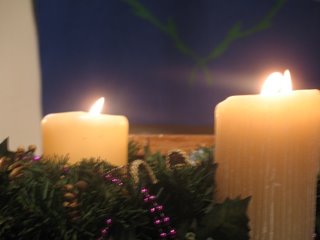
It has been a busy and eventful month for me. My school closed for the December holiday on November 23, so Kari and I moved to Nairobi to live and work. This city is quite a change from Gatundu, and I have learned about an entirely different aspect of life in Kenya. When we first got here, we weren't sure what sort of things we would be doing, but soon discovered that we would be moving from rural life straight into the center of an urban slum, Korogocho, to be specific. Every morning we travelled from our home in Westlands through downtown Nairobi to the nearest matatu stage and then walked the remainder of the way to Tumaini Church through the roads and alleyways of Korogocho. I must admit that the first day I was absolutely terrified. The only instructions we were initially given was to "carry nothing, wear no jewelry, and dress in very casual clothes." What were we getting into?
As it turns out, we had the opportunity to participate in a camp run by the TULIP ministry that encourages both discipleship and scholarship in the girls that it sponsors. This organization takes girls from the slums, girls who have few options in life, and teaches them first about Christ and then pays for their education. The girls themselves are amazing. They are open and honest about their lives, they are not ashamed or embarrassed by the circumstances of their birth. My very first day at camp, two girls from my Bible study group walked me around the area and asked quite frankly "Have you ever been in a slum before?" I had no idea how to respond.
After camp ended, Kari and I began tutoring a smaller group of girls. We discussed chemistry, biology, history, English, business studies, Christian education, basically everything they study in school except Kiswahili, which became a running joke between us as they taught us new phrases each day. As we made our way to the church which we turned into a schoolhouse each morning, we got to know not only the girls, but also the residents of the pathways we walked. We became accustomed to the sight of many things: the man selling bottles of a sticky red "cure-all" medicine where the paved road ended and the dirt began, the boys with carts of boiled eggs and sausages at the matatu stage, the women sitting on potato sacks under umbrellas peddling half rotten bananas and avocados, the old and the young sifting through piles of garbage that lined the roads. Most of all we got to know the children who inhabit Korogocho, or at least the small corner that we know, and each morning I looked forward to them running full force in our direction screaming "Wambui! Wangari! How are you?" We picked them each up individually, swung them around in the air, and set each one down laughing, only to repeat the process again. I left on our last day, my white t-shirt covered with smudged, dirty fingerprints from dozens of tiny hands that hugged me on the way out.
I am not sure what to think of the time that we spent in Korogocho. I am thankful for the opportunity to see another way of life, to know the faces and the stories, yet it brings me back to the same questions that I cannot answer. On our last day, one of the girls took us to her home for tea. Leon is one of five children supported solely by her mother who sells vegetables at a makeshift stand down the road. Their home is made of sticks and mud with a dirt floor and a tarp ceiling to keep out rain. The outside is lined with scraps of tin and the smell of sewage is ripe everywhere you turn. How do I react? Do I feel sadness? Anger? Pride? I am angry at the circumstances that have forced them into this life, sad at the brokenness of our world, yet proud of who they are and happy for what they have.
This month we celebrate the coming of our Lord into the world, the birth of Jesus Christ. Throughout Advent I have sung the familiar carol "O Come, O Come Emmanuel" each week. As I sat in candlelight at the Christmas eve service, I began to think about what it means that Christ would come into a world of such brokenness and dwell among us. I wondered at the circumstances of his birth and life. Then I realized, of course Christ was born in a manger to poor, marginalized parents, that is how most of the world lives today. Of course the smell of dirt and manure permeated the air, that is the smell most of the world knows. Emmanuel, God with us, God with all of us. The same God, with us in Korogocho and Darlington. The same Christ offers us respite from the reality of our own sin and brokenness. And He is not only with us, He is also in us. Christ is the hope, the light, and the beauty in each of us. He is the love and joy of God given to all of mankind.
Rejoice, rejoice! Emmanuel, shall come to thee, O Israel!


No comments:
Post a Comment